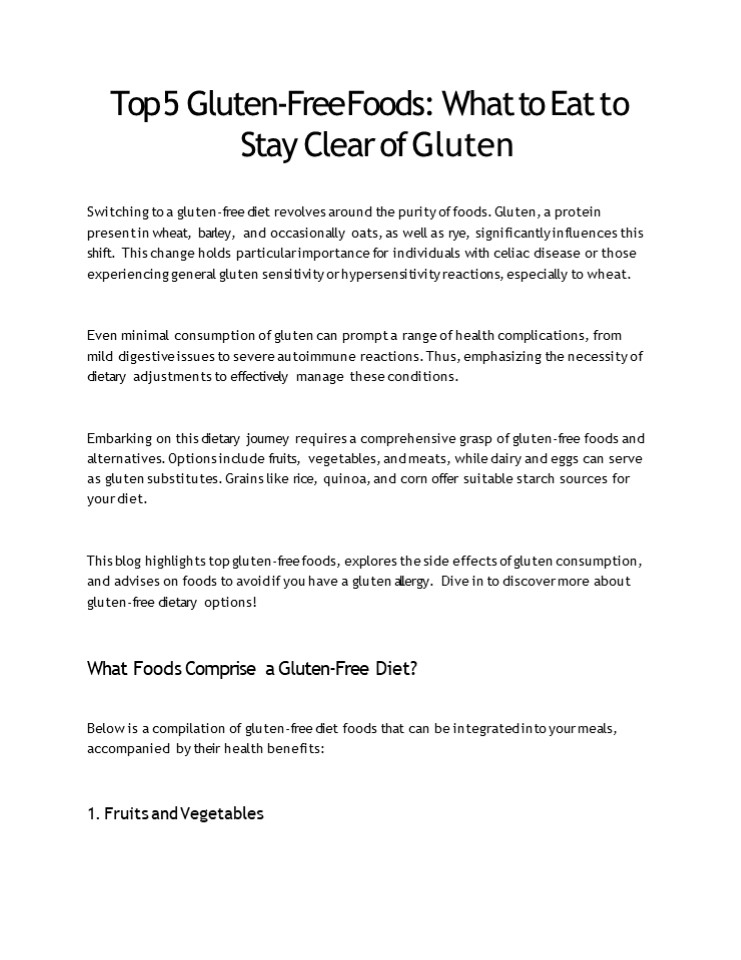Top 5 Gluten-Free Diet Foods: What To Eat To Avoid Gluten
Title: Top 5 Gluten-Free Diet Foods: What To Eat To Avoid Gluten
1
Top 5 Gluten-Free Foods What to Eat to Stay
Clear of Gluten
- Switching to a gluten-free diet revolves around
the purity of foods. Gluten, a protein present in
wheat, barley, and occasionally oats, as well as
rye, significantly influences this shift. This
change holds particular importance for
individuals with celiac disease or those
experiencing general gluten sensitivity or
hypersensitivity reactions, especially to wheat. - Even minimal consumption of gluten can prompt a
range of health complications, from mild
digestive issues to severe autoimmune reactions.
Thus, emphasizing the necessity of dietary
adjustments to effectively manage these
conditions. - Embarking on this dietary journey requires a
comprehensive grasp of gluten-free foods and
alternatives. Options include fruits, vegetables,
and meats, while dairy and eggs can serve as
gluten substitutes. Grains like rice, quinoa, and
corn offer suitable starch sources for your diet. - This blog highlights top gluten-free foods,
explores the side effects of gluten consumption,
and advises on foods to avoid if you have a
gluten allergy. Dive in to discover more about
gluten-free dietary options! - What Foods Comprise a Gluten-Free Diet?
- Below is a compilation of gluten-free diet foods
that can be integrated into your meals,
accompanied by their health benefits - 1. Fruits and Vegetables
2
- These vibrant food groups offer a diverse array
of options and are naturally devoid of gluten.
Citrus fruits are rich in vitamin C, while leafy
greens provide essential fiber, both crucial for
overall health. Fruits and vegetables are
abundant in dietary fiber, promoting digestion
and gut health. Adequate fiber intake can also
support gut microbiota, potentially aiding those
sensitive to gluten. - Meats and Proteins
- Fresh poultry, fish, red meat, pork, and turkey
offer endless culinary possibilities.
Additionally, plant-based proteins like tofu,
tempeh, legumes, nuts, and seeds provide ample
nutrition without gluten concerns. Whether
grilled, baked, or incorporated into soups and
stews, these protein sources satiate hunger while
aligning with a gluten-free lifestyle. - Dairy Products
- Unflavored milk, yogurt, cheese, and butter are
typically safe for a gluten-free diet. However,
flavored or processed dairy items may contain
gluten-containing additives. Dairy products are
rich in calcium, vital for bone and muscle
health, and provide essential nutrients such as
vitamin D, riboflavin, and potassium. - Eggs
- Eggs are a complete protein source, containing
all nine essential amino acids. They are
naturally gluten-free and versatile in various
dishes. Eggs are also abundant in choline,
crucial for brain and nervous system function,
along with essential vitamins and minerals like
vitamin A and B vitamins. - Additionally, eggs serve as binders in
gluten-free baking, facilitating light and airy
textures in desserts and pancakes without
gluten-based ingredients.
3
- Gluten-Free Grains and Starches
- Numerous grains and starches are naturally
gluten-free, offering alternatives to wheat-
based products excluded from a gluten-free
regimen. These include rice, buckwheat, corn,
amaranth, millet, tapioca, arrowroot, and
sorghum. - Include the following in your gluten-free diet
- Rice Available in various types, rice satisfies
diverse tastes and culinary preferences. - Buckwheat Despite its name, buckwheat is
gluten-free and rich in nutrients, used in
pancakes, noodles, and porridge. - Corn Cornmeal, polenta, and corn tortillas are
staples in gluten-free diets, adding sweet and
savory flavors to dishes. - Is Gluten Detrimental to Your Health?
- Gluten can pose risks to certain individuals,
particularly those predisposed or in specific
medical contexts. Here's a detailed explanation - Celiac Disease
4
- Some individuals may experience symptoms
resembling celiac disease upon gluten consumption
without the characteristic intestinal damage.
Known as non-celiac gluten sensitivity (NCGS),
symptoms may include gastrointestinal issues,
fatigue, headaches, joint pain, and mood
disorders. Eliminating gluten often alleviates
symptoms in affected individuals, although the
exact mechanisms are not fully understood. - Wheat Allergy
- Wheat allergy entails an immune-mediated reaction
to wheat proteins, including gluten. Unlike
celiac disease, which involves an autoimmune
response, wheat allergy manifests as an
IgE-mediated allergy, similar to other food
allergies. Symptoms range from skin rash and
hives to breathing difficulties, gastrointestinal
issues, and, in severe cases, anaphylaxis. - Other Health Conditions
- Some individuals with autoimmune conditions like
rheumatoid arthritis or Hashimoto's thyroiditis
may find symptom relief or improved well-being by
reducing or eliminating gluten from their diet.
However, evidence supporting gluten-free diets
for these conditions varies, emphasizing the
importance of dietary changes under healthcare
professional guidance. - While gluten isn't inherently harmful to
everyone, it can pose significant health risks
for those with celiac disease, NCGS, or wheat
allergies. Strict adherence to a gluten-free diet
is crucial for managing symptoms and maintaining
optimal health in such cases. However, for
individuals without gluten-related disorders,
there's no evidence to suggest health benefits
from eliminating gluten, which could
unnecessarily restrict dietary options. - Ultimately, consulting a healthcare professional
for proper evaluation and guidance is essential
if you suspect a gluten-related illness or
experience symptoms after consuming gluten.
5
In Conclusion Adhering to a gluten-free diet
requires diligence, but with knowledge and
careful label reading, it's achievable. By
avoiding gluten-containing foods like wheat,
barley, and rye and exercising caution with
packaged products, individuals can manage their
dietary needs while enjoying a variety of tasty
and nutritious options. Whether managing
conditions like celiac disease or choosing to
avoid gluten, staying informed empowers
individuals to embrace a gluten-free lifestyle
confidently, prioritizing their health and
well-being. About ToneOp Fit ToneOp Fit is a
platform dedicated to improving and maintaining
good health through a comprehensive range of
goal-oriented health plans with up to 3 Coach
support. With a range of Weight Management,
Medical Condition, Detox Plans, and Face Yoga
Plans, the app also provides premium health
trackers, recipes and health content. Get
customised diet, fitness, naturopathy C yoga
plans and transform yourself with ToneOp.

